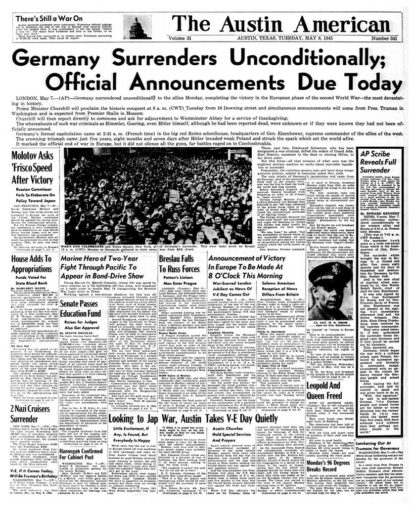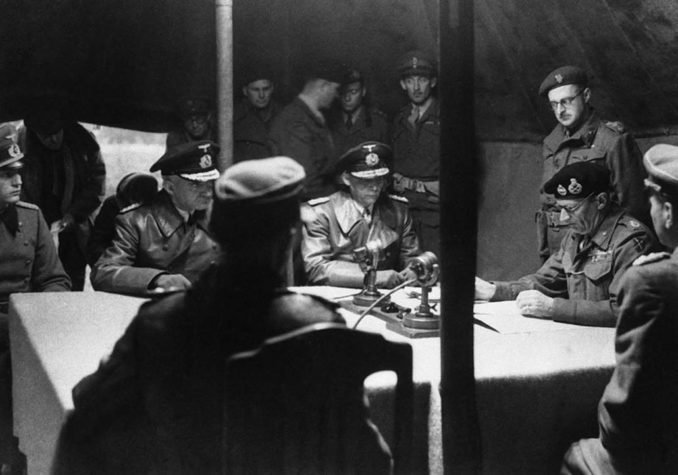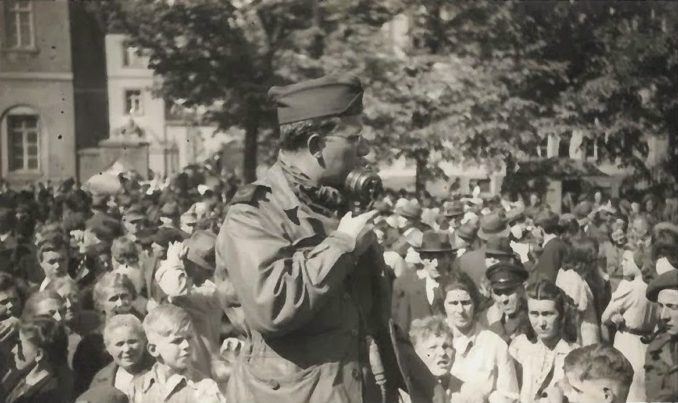
On this day 80 years ago, the Allied powers accepted Germany’s unconditional surrender, bringing an official end to World War II in Europe. We in the U.K. celebrate 8 May as Victory in Europe Day, while for German occupied neighbours it is Liberation Day. I wish all our Allies of 1945 a peaceful holiday.

or what might seem obvious reasons, today has never been a holiday in the Federal Republic of Germany, although in 1950 the German Democratic Republic declared 8 May (in typically longwinded fashion) to be the Day of the Liberation of the German People from Hitler-Fascism. The divergence reflects an important ideological difference between liberalism and communism : Liberalism tends to implicate the people in the actions of their states, making a holiday celebrating “liberation” from National Socialist rule in the post-1949 Republic at first inconceivable. Communism, however, constructs those subject to non-communist regimes as the victims of capitalist or fascist repression, and at a formal ideological level is less eager to implicate ordinary people. In practice, of course, communist regimes are anything but forgiving. During the Cold War, the Federal Republic’s refusal to recognise a holiday on 8 May also became a way of quietly rebuking the brutalities visited upon Germans in the Soviet occupied zone and their ongoing illiberal repression. This – so the quiet implication – was nothing to celebrate.

But that was all a very long time ago : German politics has engaged retard mode in the generations since. Two years ago Alternative für Deutschland co-chair Alice Weidel refused to attend an 8 May celebration at the Russian embassy. Her explanation ?
I decided for myself – it was a personal decision – not to attend for political reasons. You know, celebrating the defeat of your own country with a former occupying power is something I personally decided not to take part in – also because of my father’s refugee history.
The freakout was immediate. Green Family Minister Lisa Paus in full REEEEEEEEEEEEEEEEEEEEEEEEEEEEE
It was also really stupid. It’s a matter of historical fact, Germany was not liberated on 8 May 1945 ; rather, it was occupied by the Allied powers. This is generally understood to be the direct opposite of liberation. But beneath that there lies a much more significant ideological problem: Either Germans (as in the reigning liberal orthodoxy) bear real, tangible historical responsibility for National Socialist crimes, in which case they were defeated on 8 May ; or Germans were themselves victims of an occupying fascist regime, in which case they were liberated on 8 May. You cannot have it both ways. This brings us back to the German/Jewish paradox : the “culture of remembrance” that the German politicos have cultivated since World War II rejects the National Socialist past only by binding ever more tightly to it. For German historical guilt to remain active in the present, there must endure some identification (however negative) between ethnic German-ness and the Nazi regime. National Socialism cannot really be something from which they were freed – at least not without a long list of very carefully crafted qualifications.
As amazing as it is to type, dimwits like Paus have simply never thought this through. So eager was this sad woman to diagnose fascism in Alice Weidel, that she ended up denouncing her opponent’s circumspection as some kind of neo-Nazi sentiment. The truth is very nearly the opposite: Weidel’s was the standard party line of centre-right Union parties for more than a generation. Chancellor Ludwig Erhard in 1965 explicitly rejected the idea that 8 May might be a holiday of liberation for West Germans, characterising the moment instead as the “day of German capitulation.” Erhard said that one would have been justified in calling the occasion a “liberation” only “if injustice & tyranny had been eradicated from the entire world with the defeat of Hitler’s Germany” (It had not been, ‘cos communism.) Even in that case, this “liberation” would not be specifically German, but would pertain to all of humanity. After various Twitter users explained all of this to Paus, she did not observe the simple rule of holes and stop digging. Rather, she pleaded that she was not actually stupid, because Federal President Richard von Weizsäcker ushered the notion of a German “day of liberation” into the orthodox menagerie in a notable speech made in 1985.
Kapow !
Checkmate fascists !!
Except, with this reference, Paus actually checkmated herself, revealing that in all likelihood she’s never read von Weizsäcker’s words at all. While he did indeed say that “8 May was a day of liberation” when Germans were all freed “from the inhuman system of National Socialist tyranny,” he also said that “8 May is not an occasion for us Germans to celebrate” and that “we certainly have no reason to take part in victory celebrations on this day.” Unlike Paus, von Weizsäcker was all too aware of the tensions inherent in the notion of German “liberation.”
It is all well and good for Germans to hate Nazis in the Federal Republic, and it is even better for them to tell everybody that they are not a Nazi (if you can still find anyone who cares to listen). They cannot, however, draw the distinction between themselves and the Nazis too sharply, or cast their lot in with liberated neighbours too unreservedly. However right and just and antifascist this may feel, it brings you very close to the line of political transgression – certainly much closer than joining Alice Weidel in her decision to leave 8 May celebrations to the victors. Orthodoxy is a subtle and complicated thing. And as many an ancient theologian discovered, if you practice it too vigorously, you actually find yourself a heretic.
© DJM 2025



